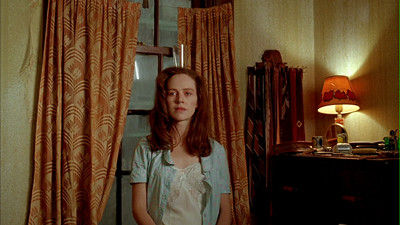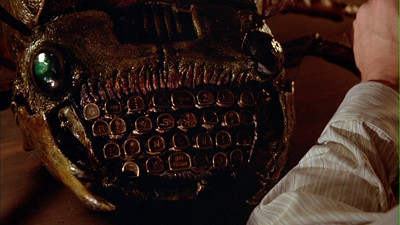
I suppose it is fitting that my memory of when I first saw Naked Lunch is hazy, as the movie itself is hazy and drug-addled and gleefully confused. I thought it came out when I was in high school, and that I had snuck down to Los Angeles from my home in the Antelope Valley to see it. My friends and I often saw arty movies that way, the stuff that didn't make it to our mall. It was less expensive than rock concerts, plus we could also get back before anyone noticed we were gone.
It turns out Cronenberg's movie came out my sophomore year in college. A limited release just after Christmas in 1991. A winter release also then makes it questionable that I thought I had seen it with a girl--the same girl who I talked about in the My Life as a Dog review. It always comes down to a girl, and quite often that girl. It would make sense that she and I would see it together as she had a fascination with the Beats, particularly Kerouac, that I didn't understand but faked a shared interest in because that's often the kind of rotten thing you do when you are desperate to get someone to love you. Other guys do it to get a girl's shirt off, but I've never been good at being a cad.
I made some noble efforts to read various works by the Beat writers, including her favorite The Dharma Bums
I'm not trying to be needlessly provocative here. There are a lot who will see these assessments as heresy, and if you're feeling apoplectic, brace yourself, because it's only going to get worse.
For my money, William S. Burroughs is one of the emptiest literary figureheads of all time.
There. I said it.

I've tried to understand the fascination with his work, tried to see why he has garnered so much attention from the likes of Kurt Cobain and Gus Van Sant. Maybe it's because I've never done drugs, I am not impressed by his alleged outlaw antics; then again, I've never been a bootlegger, but I love me a good movie about prohibition, so who knows? I just find his work impenetrable and needlessly obtuse. It's one of those cases where the artist hasn't given us the decoder ring, and so it seems mysterious and rebellious, so ipso facto it must be good. When I read Naked Lunch
Given the classic mess that is the book Naked Lunch, it's all the more impressive that David Cronenberg managed to pull a semblance of a narrative out of it in order to make his movie. Even more impressive is the fact that I actually like it.
Part of Cronenberg's successful strategy is looking beyond the single book at the whole of Burroughs' work and also his biography. He drapes the entire film in literary fabric, with the reference to Kafka in regards to the narcotic high the film's characters get from bug powder dust being a fairly telling allusion. The plot of the movie is Kafakesque with interwoven lines of paranoia, labyrinthine bureaucracies, and the self-replicating puzzle that the film's hero finds himself in.

Peter Weller plays William "Bill" Lee, an obvious Burroughs stand-in, with his monotone speaking voice, raincoat, and fedora. Bill works for an extermination company, and it turns out that his wife, Joan (Judy Davis), is stealing his roach powder and shooting it into her bloodstream with his book-writin' buddies (analogues to Kerouac and Ginsberg). A drunken accident leads to Bill shooting his wife, and he has to go on the lam, becoming a strung-out version of Hitchcock's wrong man, only this time he's pretty much the right man, he really did it.
The catch being that Bill is unwittingly locked in a plot larger than that of his regular life. He has been visited by a large insect-like creature who has informed him that Joan is really a secret agent for Interzone, a middle eastern nation somewhere in the middle of, well, not quite sure. North Africa, maybe, but also possibly reachable by bus. After the shooting, Bill meets a creature named Mugwump--it looks like a demonic alien--who instructs him to buy a typewriter for writing reports of his activities and gives him a ticket to Interzone. He can go there to hide from the law and work to take down the corporation that was controlling his wife. There is never really any indication of who this opposing force is, whose side Bill is actually working on, but that isn't really important.
Naked Lunch is a movie about doubles. Everything in the movie has a natural opposite. Even Kerouac (Nicholas Campbell), with his rough exterior and his insistence that rewriting is censorship, is mirrored by Ginsberg (Michael Zelniker), more fey and dogmatically committed to revising his poetry at least a hundred times. In Cronenberg's world, everything could be something else, nothing should be assumed to be as it seems. (Even the old-style puppetry fosters the sensation of "What do you choose to believe?" by sitting somewhere between convincing and false.) Typewriters turn into grotesque creatures with pulsing sexual organs, meaning that the act of creation is a far more intimate, sensual experience than simply banging out some words, and to use another man's typewriter could be the greatest of indiscretions. Being an undercover agent not only means you have multiple identities, but it is also perhaps a game crafted merely to mask the agents' homosexuality--or vice versa, as Bill's typewriter tells him that being queer is one of the best covers a spy could have. Seemingly struggling with his own sexuality, are Bill's hallucinations his own sexual repression breaking down? It's a less pedestrian explanation than if they are merely drug-induced fantasies. Then again, maybe it all really is happening. Even if it's imagined, it's real to Bill.

Once he is in Interzone, Bill gets wrapped up in a bug drug trade, as well as a pansexual party crowd run by enemy agents Joan and Tom Frost. Tom is played by Ian Holm, but Joan is Judy Davis again, and Bill is obviously drawn to her because she is a doppelganger for his deceased spouse. Tom telepathically informs Bill that he has been slowly killing off his Joan, as well, suggesting that they are one in the same, doubles of each other, two murderers.
My favorite joke on dual nature, however, is the tres gauche dandy Yves Clouquet (Julian Sands). Pronounced the first time we hear it as "Eve Cloaky," the name has many obvious double meanings. Eve evokes original sin, and Cloaky not only conjures the image of a cloak--something to hide behind, possibly while wielding a dagger--but of the Norse god of lies, Loki. Another great play on words comes when Bill types a sentence beginning with the phrase "I am very" and accidentally mistypes it as "I am vary." Yes, indeed, you are!
The story eventually doubles back on itself. The cure proves to be the sickness, and Bill must redress his actions against Joan, and the unconventional plot must have a conventional resolution, the hero rescuing the girl.

Or so it would seem. The journey of Naked Lunch is really Bill Lee seeking the most direct path to the subconscious. It’s that debate between Kerouac and Ginsberg (whom I should note are called Hank and Martin in the movie, I just refuse to pretend). "Exterminate all rational thought." What is the fastest way to get into the uncensored part of your imagination, the inner (Inter)zone. Bill has found that path, even if he is not fully aware of it. His reports have turned into the novel Naked Lunch, which he doesn't remember writing. Losing his drugs, losing his typewriter, accepting the illusion and no longer questioning, Bill needs to keep his grip on his dreamscape. His rescue of Joan from Benway (Roy Scheider) is not a magnanimous act. To stay on his writerly path, he must be in exile from others. Leaving Interzone for Annexia, a Soviet bloc with a name that indicates separateness, he must repeat again the heinous act that caused his initial banishment.
If then we are to accept that a big problem of Beat writing is the notion that just because it happened to the writer, he felt it was interesting enough to share, Cronenberg wouldn't necessarily disagree. For many, there is still an impenetrable veneer over the Naked Lunch movie, with the unexplained remaining unexplained presumably because it is inexplicable. Like hearing another person relate his or her dreams, even if the dreamer is Jack Kerouac, they are only of sufficient interest to the listener if they have some inside track that allows them to understand the dreamer's code. What Cronenberg is saying is that that this level of otherness is required in order for a writer like Burroughs to unleash his visions on the world, and while it may not all be clear, it doesn’t have to be. This makes his movie less of an adaptation than it is a translation, peeling back the layers of the typewriter to bury his hands in the meat, realigning the symbols to make a more accessible language.
Thus, through Cronenberg's eyes to mine, I understand it a bit more, I get what Burroughs was going for, even if I still don't like it. I'll keep the movie, the rest of you can have the book.


12 comments:
you know i watched this movie, read the book, and read you're review. But I still have no idea whats going on, so i'll just quote the simpsons "I can think of two things wrong with that title"
Quoting the Simpsons always earns you points with me!
While I don't agree with your outlook on the beat writings, preferring to believe that when you speak of yourself you speak of the universe, I just wanted to say that your review was great and really illuminated a lot about a movie I already love. Thank you.
Thanks! Nice to see people finding the old reviews still. :)
Maybe the best analysis I've found on this film. I have been scratching my head for days trying to understand this film more as I believed that there was certainly more here than meets my senses. Not a HUGE Cronenberg fan either, but something about this just works. Thanks for the insight I will certainly browse your site for more reviews! BTW I was searching for a Safe (1995) analysis. Do you have one yet?
Thanks again. I have no done SAFE yet, but will try to fast track it. Provided I can pick it up in the sale this month, since it's one I am still missing in my collection. (I'll see if it's on Filmstruck, too.)
Great review!
Thanks. I recently saw this and it sort of saved my existence. I suggest watching with subtitles as their are a lot of subtle things IMO on par with later Kubrick films. Interested to hear your take. Peace!
awesome!
Post a Comment